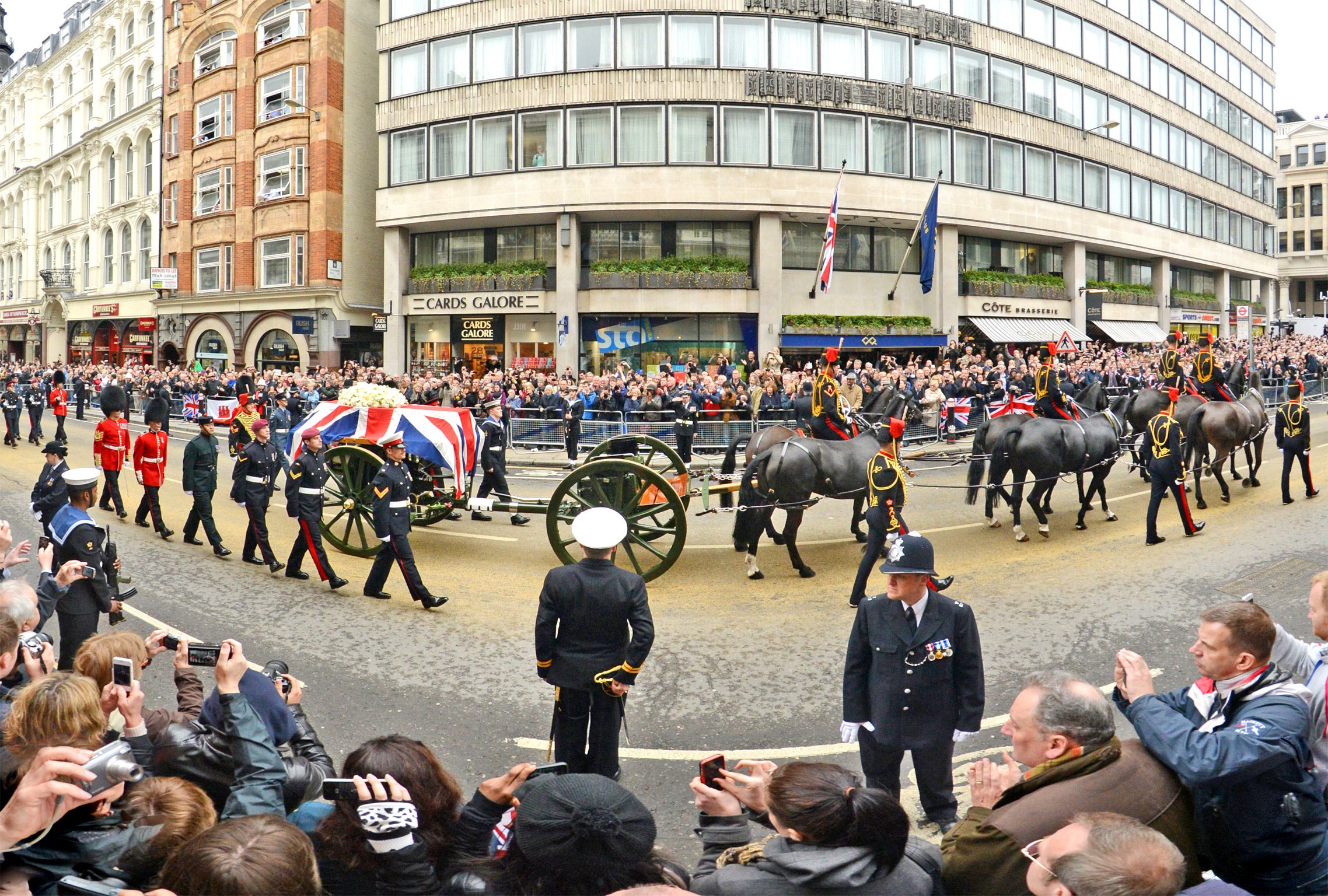Pomp, grandeur and even a little joke – how a ceremonial funeral took the life of Margaret Thatcher beyond politics and back down to humanity


If nothing else the sheer classiness of the route for Margaret Thatcher's last journey was of a piece with the grandeur of the occasion.
It passed through three of London's greatest buildings on its way to Mortlake, where she was cremated: from the more than millennium-old Westminster Hall to St Paul's for the funeral itself and on to that other high watermark of Christopher Wren's career, the Royal Hospital in Chelsea, where her ashes were finally brought back to be interred.
For this was a state funeral in all but name. The lavish military honours – amid which the coffin draped in the Union Flag, and topped with an ample bouquet of white roses from her family, arrived on a gun carriage of the Royal Horse Artillery – were no less exceptional than the pomp inside the Cathedral itself. The 86-year-old Queen, clad in black from head to foot, and the Duke of Edinburgh were met at the West Door exactly 15 minutes before the service began, by a reception party including the Archbishop of Canterbury and the Lord Mayor of London, robed in scarlet and carrying something called the "Mourning Sword". All this executed with the precision for which British pageantry is justly famous.
The music, reaching its climax with the adaptation from Holst's "Jupiter" for that resolutely patriotic hymn "I vow to thee my country", made full, glorious use of the acoustics of Wren's great soaring dome. This meant, however, that those worried that a ceremony of this magnificence was somehow inappropriate for a politician, who for all her qualities was not Churchill, would not have their fears allayed.
It may be unfair to suggest that there was a hint of L'etat c'etait moi about the service; but there were times – despite the clearly genuine tears of George Osborne and others – when its solemn obsequies were more reminiscent of a coronation or an archiepiscopal enthronement.
Faced with a difficult task, the clergy did pretty well. David Ison, the Dean of St Paul's, welcomed the huge 2000-plus congregation by declaring that they had come to "recall with great gratitude, her leadership of this nation, her courage … and her resolve to accomplish [this a well judged eschewing of any partisan endorsement] what she believed to be right for the common good".
Like the Dean, the Bishop of London Richard Chartres stressed her well attested "personal kindness" including to those who "were not, in the world's eyes important". He skilfully risked annoying some of the mourners by reminding them that the Methodism in which she was brought up had also inspired the Tolpuddle Martyrs. And in a much needed flash of humour, recalled her grasping him by the wrist at a dinner and telling him "Don't touch the duck pate, Bishop. It's very fattening."
The clear, American-accented reading from Ephesians by Lady Thatcher's granddaughter Amanda was a timely reminder that this was also a family bereavement. And as at many less grand funerals, there were the necessary, if maybe temporary, soothing of old enmities, whether of Boris Johnson sitting alongside Michael Howard, who sacked him from the Shadow Cabinet for fibbing about an extramarital affair, or of Cherie Blair actually chatting to Gordon Brown.
Despite the 11 serving prime ministers paying their respects, the international presence was borderline B-list. But here too there were ironies of long-forgotten history. Was Dick Cheney, who read Mikhail Gorbachev so much less well than Prime Minister Thatcher, repenting his brutal dismissal of his capabilities when she was rightly courting the Russian leader? Had the Israeli ambassador reported to his Likud Prime Minister Benjamin Netanyahu that Gerald Kaufman had recalled in the Commons last week her worry about the "rightward" trend in Israel's politics and her tacit advice to its citizens to vote Labour in the late 1980s?
Was her contemporary, the Canadian ex-premier Brian Mulroney wishing he too had been forced out like her rather than end as the one democratic prime minister with lower approval ratings than the level of interest rates in his country? And what, finally was going through the mind of the Queen, attending the funeral of her eighth prime minister as she had attended only that of her first, now that we know from the most faithful of all Thatcher lieutenants Lord Powell, that the Palace did indeed fret that the South African policy of the time might endanger the Commonwealth?
The danger of summoning the full "non-political" panoply of the state to bid farewell to a Prime Minister – albeit a hugely successful one who certainly changed Britain as only Clement Attlee did in her lifetime – is that it suggests a Conservative prime minister has a place in history "beyond politics". Which she hasn't.
But as Bishop Chartres eloquently reminded the mourners, she was not just a "symbolic" figure, but one subject to "the common destiny of all human beings". Here, he said, she "is one of us".

Join our commenting forum
Join thought-provoking conversations, follow other Independent readers and see their replies